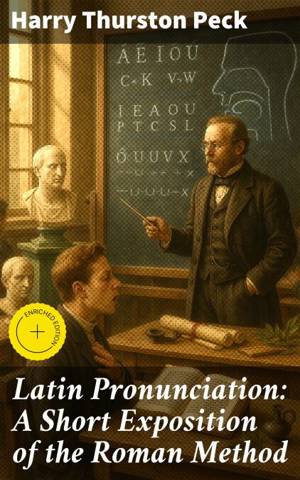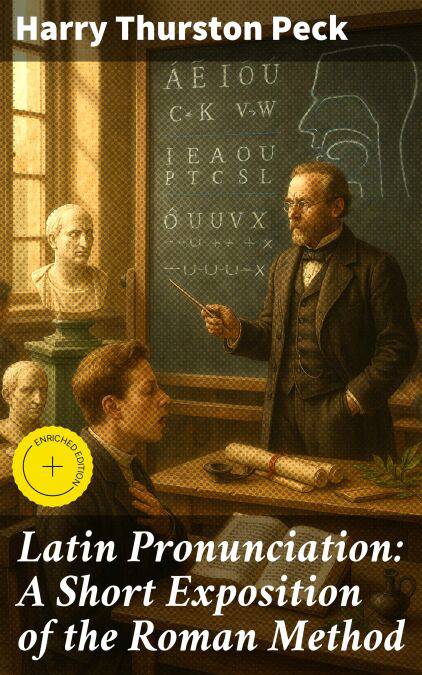
- Afhalen na 1 uur in een winkel met voorraad
- Gratis thuislevering in België vanaf € 30
- Ruim aanbod met 7 miljoen producten
- Afhalen na 1 uur in een winkel met voorraad
- Gratis thuislevering in België vanaf € 30
- Ruim aanbod met 7 miljoen producten
Zoeken
Latin Pronunciation: A Short Exposition of the Roman Method E-BOOK
Enriched edition. Mastering the Roman Method of Latin Pronunciation: A Comprehensive Guide for Students and Scholars
Harry Thurston Peck
E-book | Engels
€ 0,49
Omschrijving
In "Latin Pronunciation: A Short Exposition of the Roman Method," Harry Thurston Peck offers a meticulous examination of the nuances and frameworks governing Latin pronunciation, emphasizing the Roman method as the foundational standard. The book is distinguished by its scholarly approach and clarity, making it accessible to both novices and seasoned linguists. By situating Latin within its historical and cultural context, Peck effectively showcases how pronunciation shapes the understanding and appreciation of the classical language, while threading nuanced distinctions and phonetic details throughout his exposition. Harry Thurston Peck (1843-1911) was a notable classicist and educator with a profound commitment to the teaching of Latin and Greek. His extensive academic background, which included tenure at Columbia University, established him as an authority on classical literature and linguistics. Peck's interest in pronunciation likely stemmed from his desire to restore the authenticity of ancient languages and convey their true essence to modern readers and students, reflecting the shift towards more historically accurate methodologies in language education during his time. This book is a vital resource for linguists, educators, and students alike, inviting readers to appreciate the intricacies of Latin pronunciation. Those seeking to deepen their understanding of the language will find Peck's work invaluable, as it not only serves as a reference guide but also as a fascinating exploration of the interplay between language, culture, and education.
In this enriched edition, we have carefully created added value for your reading experience:
- A succinct Introduction situates the work's timeless appeal and themes.
- The Synopsis outlines the central plot, highlighting key developments without spoiling critical twists.
- A detailed Historical Context immerses you in the era's events and influences that shaped the writing.
- A thorough Analysis dissects symbols, motifs, and character arcs to unearth underlying meanings.
- Reflection questions prompt you to engage personally with the work's messages, connecting them to modern life.
- Hand‐picked Memorable Quotes shine a spotlight on moments of literary brilliance.
- Interactive footnotes clarify unusual references, historical allusions, and archaic phrases for an effortless, more informed read.
In this enriched edition, we have carefully created added value for your reading experience:
- A succinct Introduction situates the work's timeless appeal and themes.
- The Synopsis outlines the central plot, highlighting key developments without spoiling critical twists.
- A detailed Historical Context immerses you in the era's events and influences that shaped the writing.
- A thorough Analysis dissects symbols, motifs, and character arcs to unearth underlying meanings.
- Reflection questions prompt you to engage personally with the work's messages, connecting them to modern life.
- Hand‐picked Memorable Quotes shine a spotlight on moments of literary brilliance.
- Interactive footnotes clarify unusual references, historical allusions, and archaic phrases for an effortless, more informed read.
Specificaties
Betrokkenen
- Auteur(s):
- Uitgeverij:
Inhoud
- Aantal bladzijden:
- 160
- Taal:
- Engels
Eigenschappen
- Productcode (EAN):
- 4064066223441
- Verschijningsdatum:
- 9/12/2019
- Uitvoering:
- E-book
- Beveiligd met:
- Digital watermarking
- Formaat:
- ePub

Alleen bij Standaard Boekhandel
Beoordelingen
We publiceren alleen reviews die voldoen aan de voorwaarden voor reviews. Bekijk onze voorwaarden voor reviews.







